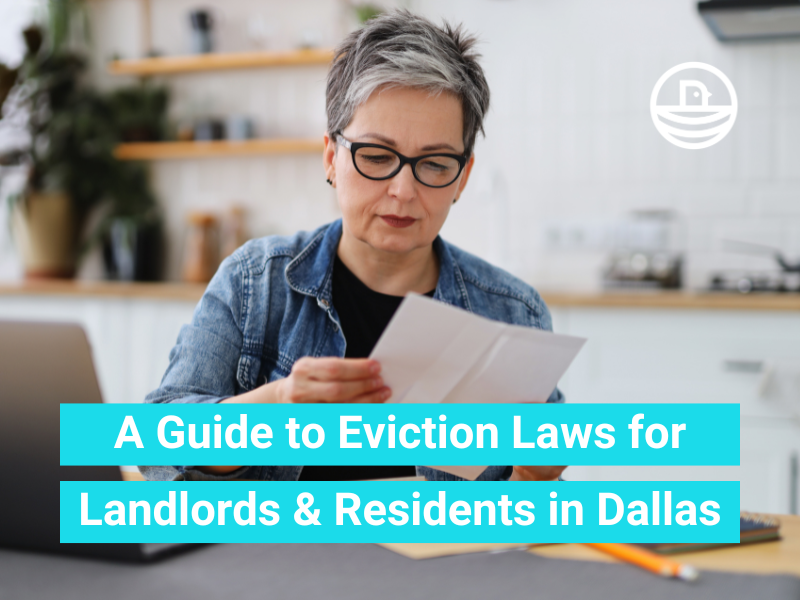Although 66% of Americans own their homes, renting is becoming increasingly popular—especially among younger generations. In fact, more than half of Gen Z says renting is a smarter option than buying. While this is great news for landlords in Dallas, Texas, it also means more evictions as people struggle to keep up with rising costs.
Understanding the ins and outs of Dallas eviction laws is essential for navigating this tricky process. These laws, rules, and regulations help keep things fair for both landlords and residents, but they can be confusing if you’re not familiar with the details. This guide explains the eviction process in Dallas, Texas, so both landlords and residents know what to expect and how to protect their rights.
Dallas, Texas Eviction Laws: What You Need to Know
.png)
Eviction laws in Dallas fall under the Texas Property Code. These laws are in place to guide both landlords and residents through the eviction process. They protect landlords from tenant violations and tenants from unfair treatment. Here’s how eviction regulations work in Dallas:
Notice to Vacate: Before starting the eviction process, landlords are required to give residents a written notice to vacate. Within this notice, it must be stated how long the tenant has to either fix the issue or move out. The notice has to give the tenant three days minimum, but the lease agreement may specify a different timeline. In rarer cases, a 30-day notice may be required. There are multiple ways this notice can be given, including by mail, in person (handed to someone 16 or older), or by posting it outside the property or dropping it through a door slot.
Legal Grounds for Eviction: Landlords can only evict tenants for legal reasons, like not paying rent, breaking lease rules, or engaging in illegal activities on the property. If the tenant stays on the property even after the lease has ended, they can also be evicted. The reason for eviction must be clearly stated in the notice to vacate.
Filing an Eviction Case: If the tenant doesn’t comply with the notice, the landlord can file an eviction lawsuit, known as a forcible detainer suit, in the local justice of the peace court. Filing this lawsuit in the precinct where the property is located is necessary to legally remove the tenant. Landlords must provide the court with a copy of the notice to vacate, the lease agreement, and any evidence supporting the eviction. Filing fees in Dallas for an eviction sit at $134. After filing, a constable or sheriff will deliver the suit papers to the tenant either in person, through the mail, or by affixing it to the rental unit.
Court Hearing: Both landlords and residents have the right to share their side of the story in court. The judge will issue a ruling based on the evidence. If the judge rules in favor of the landlord, they will issue a judgment of possession, giving the tenant a specific amount of time to leave. However, if the tenant decides to appeal the decision, the issuance will be delayed until the final judgement.
Enforcement of Eviction: If the tenant still doesn’t leave, the landlord can request a writ of possession, which allows law enforcement to remove the residents from the property. Law enforcement is required to give 24 hours notice before removing the tenant and their belongings from the unit.
Improperly delivered notices or notices that lack required details can result in the eviction case being dismissed in court.
Tips to Help Landlords Navigate Dallas Eviction Rules
Understanding the eviction process can help landlords avoid legal and financial setbacks. Here are some tips to keep in mind:
Provide Proper Notice: Follow all legal guidelines for issuing a notice to vacate to residents.
Document Everything: Keep detailed records of lease agreements, payment histories, and communication with tenants. A paper trail can make all the difference if the case goes to court.
Use the Correct Court: Ensure you file the case in the appropriate precinct to avoid delays. Each precinct can be located on the Dallas County Justice of the Peace Courts website.
Avoid Illegal Actions: Locking out tenants, shutting off their utilities, or harassing them is prohibited by law.
Seek Professional Support: Property management companies offer services to handle evictions. In some cases, they may even cover legal fees.
By following Dallas eviction laws, landlords can protect their investments and minimize disputes.
Eviction Rights for Dallas Residents to Memorize
Tenants who are facing eviction have rights that protect them from unlawful practices. Here’s what’s important for them to know:
Avoid Panicking After a Notice to Vacate: Receiving a notice doesn’t mean you have to leave immediately. Tenants have at least three days to comply before landlords can file a lawsuit. Likewise, landlords must still win the court case to evict their tenants.
Review the Notice for Errors: Make sure the landlord gave enough notice and followed the law.
Attend the Hearing: Once the eviction suit is filed, the hearing must take place within 21 days but no sooner than 10 days. Missing the court date can result in a default judgment against you. Bring evidence, such as payment records or proof of landlord retaliation.
Appeal the Decision: If you lose the case, you can’t take action for at least five days. This gives you the chance to appeal the decision. If you decide to appeal, the new hearing will be scheduled a minimum of eight days later.
Seek Legal Aid: Organizations like Legal Aid of Northwest Texas provide assistance for low-income tenants.
Understand Retaliation and Discrimination Laws: The law makes it clear that landlords may not discriminate or retaliate against their tenants. These are not legal grounds for eviction.
Understanding eviction rules in Dallas can empower residents to defend their rights and avoid unlawful evictions.
The Importance of Understanding Eviction Laws
Eviction can be a complicated process, but understanding the law ensures fairness for both parties. For landlords, proper compliance with Dallas eviction regulations protects their property and reputation. For tenants, knowing their rights can prevent illegal or unfair treatment.
Whether you’re a landlord or tenant, staying informed about the rules is the key to smoothly navigating this process. If you’re a landlord, consider working with a property management company like Evernest to keep yourself and your rental property safe. Evernest even offers an Eviction Protection Plan for only $150, which covers the legal fees, court costs, and other charges associated with evicting a tenant. To learn more about how Evernest could make a difference for you, contact a representative today!


